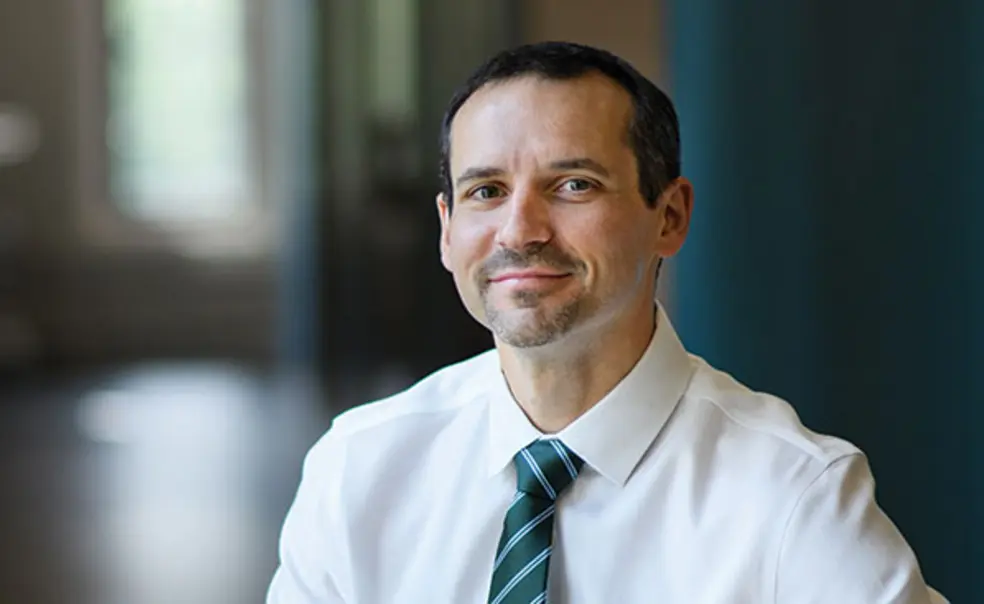Teaming Up: Counselors, Peers Aim to Reduce Stigma and Support Mental Health for Student-Athletes
Q&A: Jonathan Pastor
In athletics, a realm that preaches mental toughness and perseverance, it can be difficult for students to recognize when they need to speak with someone about a mental-health issue. Dr. Jonathan Pastor, the University’s associate director of counseling and psychological services, is trying to reduce stigma and make counseling more accessible to Princeton student-athletes. He spoke with PAW about programs that work toward those goals.
In what ways do the pressures that student-athletes face differ from the ones all students face?
There’s quite a bit in common. It’s a very high-pressure environment. People are trying to — and are expected to — achieve at a high level across different domains. For student-athletes, a lot more is asked of them in terms of the day-to-day, especially when they’re in season. They’re asked to wake up early to get to practice. Sometimes they have multiple practices in a day. Student-athletes have tremendous pressure to fit everything in, and that pressure can lead to stress, and stress can lead to mental-health issues. Finding time to sleep, to eat, finding time for self-care, to connect with friends — all the things that may be a little easier, on balance, for a lot of students — can really be a challenge for student-athletes. And they don’t complain about it. They are, on average, a pretty stoic bunch.
The sport is so much a part of their identity, and that’s something we really work hard to recognize and embrace. It’s so hard to have it mean that much to do well and also keep things in perspective.
You lead TIGERSPAW, a health-services team devoted to student-athletes. How does it work?
It is a multidisciplinary group of professionals to support the health and well-being of student-athletes. Margot Putukian, who is the director of athletic medicine, was really pivotal in the formation of TIGERSPAW. It stands for Tiger Student-Athlete Performance and Wellness, but the focus is really more on wellness than performance. How can we address mental-health issues more effectively? How do we reduce stigma among student-athletes so that they are more likely to seek help? How can we improve the availability of specialized services? How can we improve communication?
The TIGERSPAW team comes together once every three weeks during the school year to discuss cases where there are mind-body, holistic issues. For example, injury response is a big one: how people are healing from injuries on a physical, medical basis but also on a psychological basis. We’re making sure we are aware of what’s happening in the other domain and tailoring a holistic approach to treating people.
There are also members of the athletics department who are part of TIGERSPAW, and we come together twice a year, not to discuss clinical cases — that is private within University Health Services — but to talk about trends and systemic issues.
Are coaches paying more attention to mental health?
Definitely. There have been a number of coaches who have been strong supporters of TIGERSPAW and have been really active in making it OK for their players to get help.
We also have a Student-Athlete Wellness Leader (SAWL) program, and [the training includes] a strong mental-health component. Those leaders are typically sophomores or juniors on their teams — I think there are about 70 or 80 across all the teams — and that’s been a really useful conduit. The athletic trainers work closely with the SAWLs; the physicians work with the SAWLs.
Counseling and Psychological Services Director Calvin Chin founded the Princeton Distress Awareness and Response program, which is a bystander program to help people help their peers and colleagues if they’re in distress, mental-health wise. We’ve done that training for both the coaches and the SAWLs, to help people be aware of the resources and get people connected when they encounter people who seem to be suffering.
You mention that athletes tend to be stoic. Is it a challenge to get student-athletes to seek help?
The short answer is yes. There’s definitely a range in terms of openness to seeking help. Some people are very reluctant to engage. And there are different ways that we try to make that process easier for them — if they prefer to work with, for example, a male counselor or female counselor or someone with a particular specialty area, we try to connect them with that person to make it easier for them to open up. Sometimes we’ll work with coaches to help them explain the process to the student-athlete.
It’s definitely improved. Brian Hainline, the medical director of the NCAA, has made a huge push in raising awareness about mental-health issues. A lot of prominent athletes around the country have come forth and spoken openly about their own struggles with mental health. [NBA star] Kevin Love is a recent example. He talked about performance anxiety and panic attacks — issues that are a lot more common than people realize. And I think that’s lowered the defenses of people who have been struggling behind the scenes and maybe felt ashamed or were worried about seeking help. They now feel empowered.
In conjunction with athletics, we brought in Kate Fagan, who wrote the book What Made Maddy Run, about Madison Holleran, a student-athlete at Penn who tragically killed herself a few years ago. The event was very well attended — a lot of student-athletes participated and spoke directly with Kate, and they could take those messages back to their teams. Because that’s really our biggest fear, that someone would end their life. We’re constantly working to help people in lots of different ways, but that’s the most fundamental thing that we want — to make sure that people stay safe and that people who are really suffering can get the help they need.
Interview conducted and condensed by B.T.












No responses yet